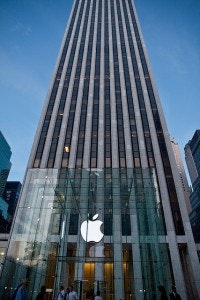Like continental drift, it’s the company that’s slowly gaining ground beneath people’s oblivious feet. Google (NASDAQ:GOOG) is morphing, and for technology there’s nothing as central as innovation.

What stability does Google offer?
Key to stability is that Google is waging a multi-faceted battle. Google is not just scraping up revenue through advertisements on its search engine and its software ecosystem, Android, but is in fact feeding off its competitors.
So complex is Google’s math going forward that Android’s creator, Andy Rubin, got caught in the permutations. While Rubin saw Android as a way to flatten out competitors on other platforms, primarily iOS and Windows on Nokia Corporation (ADR) (NYSE:NOK), Nicholas Carlson of Business Insider suggests Larry Page didn’t quite share the same ideology. Google currently makes more money from iOS than it does from Android, and Larry’s plan to beat the competition seemingly includes not absolutely obliterating it, even as Yahoo plans to wrestle Google off the iOS platform. Android raked in just less than $550 million for Google between 2008 and 2011. Its association with Apple (NASDAQ:AAPL) devices, which include its Google search engine and Google maps, produced more than four times the revenue collected from the Android platform. The figures Guardian calculated via court documents availed by Google over Oracle’s copyright infringement lawsuit.
Google still stands to gain
The gains of both Apple Inc. (NASDAQ:AAPL) and Samsung are boon to Google, even as they wrangle for market share. From January to April this year, Apple Inc. (NASDAQ:AAPL)’s iPhone 5 moved more units on providers AT&T, Sprint, and Verizon. Apple Inc. (NASDAQ:AAPL)’s share in profits from handsets stood at 57% for the first quarter, versus Samsung’s 43%. For the same period last year, Apple domineered at 74% against Samsung’s 26%. Apple Inc. (NASDAQ:AAPL)’s figures now face a steady slump with the introduction of the Samsung S IV. The release of an iPhone 5S is Apple Inc. (NASDAQ:AAPL)’s best bet to fend off the S IV’s larger 5-inch HD screen and more appealing features.
Luckily for Google, in the larger integrated technology battle, Microsoft Corporation (NASDAQ:MSFT) turned barrel to head with Windows 8. Even though department chief officer, Tami Reller, boasted of 100 million licenses sold, the introduction of Windows 8.1, formerly called Windows Blue, definitely suffices as proof of the disquieting actual number of PCs running on it.
First-movers advantage
Moving forward, in the short term, Google has unprecedented advantage over both Apple Inc. (NASDAQ:AAPL) and Samsung by the introduction of the newest concept since the tablet, Google Glass. Already, speculation is abounding that Apple and Samsung are on their own smart mobile spectacles project.
In a 2012 conference, Sergey Brin, co-founder, said, “About 80 per cent of the things that people do on a smartphone could be handled by the glasses,” and therein lays the test. The sole challenge for Google will be how to sell Glass as something your average Joe can buy and find useful. It may, at present, sit next to superfluous in a world where mobility is being pushed to stratospheric limits. Is a pair of specs in hand really worth two (smartphones) in the pocket? Sales have to be revved up unreservedly. This will include a lot of aggressive marketing. While Apple sits on its snob appeal, Google should reach out even to the remote villages in Tibet.
Other projects
Google’s $125 million investment into the P2P (peer-to-peer) lending sector is an added boost to its portfolio, especially when analysts’ projections for the P2P industry point to a definite growth.
Besides the venture into smart spectacles, Google is also creating a smart watch, something Apple and Samsung are also keenly developing. Tim Bradshaw of the Financial Times notes,
While Glass is being created in its X Lab, home to experimental “moonshot” projects such as the self-driving car, Google’s smart watch is being developed by its Android unit, according to a person briefed on the project, to act as an extension to the smartphones using that operating system. The project is separate from Samsung’s efforts, the source said, although there is no indication when it might launch.
Whether Google was truly engaged in acquisition talks with WhatsApp is an issue best addressed by the two. The real headline, however, is Google’s aggressive M&A (mergers and acquisitions) stance. The acquisition of Motorola was squarely so that Google may acquire the patents the entity had and stem off an eternity of lawsuits from competitors. Bar the patents, it’s still breathtakingly unclear what Google may use Motorola Mobility for in the future, since its Nexus tablets are made by the Taiwanese company, Asus. Yet, it still presents a limitlessness of abilities in hardware production.
Integrated technology is the battle frontier now for Apple, Microsoft Corporation (NASDAQ:MSFT), and Google. When you think technology investments, think the future and reasons IBM lost its monopoly in the 1980’s. Adaptation is key, which is why Google stocks, for now, provide safety.
The article Want Safety? Here’s Where To Put Your Money originally appeared on Fool.com and is written by Frank Midega.
Copyright © 1995 – 2013 The Motley Fool, LLC. All rights reserved. The Motley Fool has a disclosure policy.